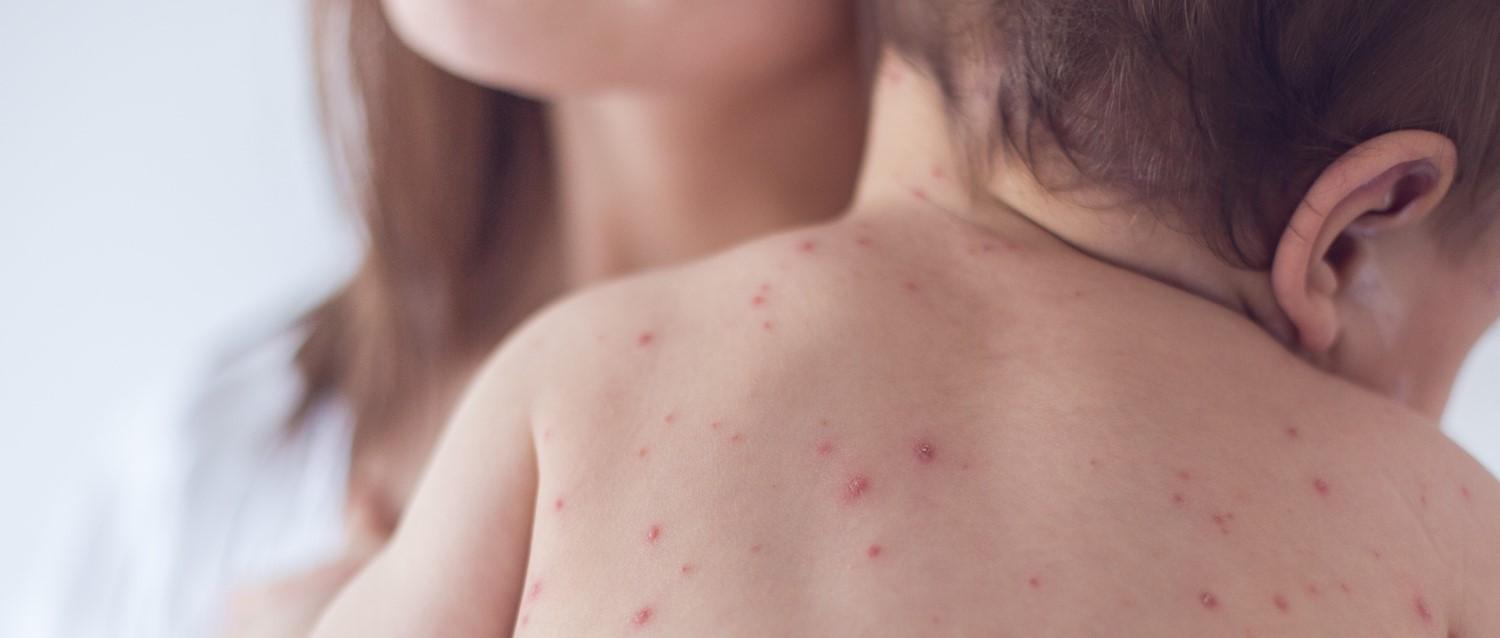
What is the difference between hand, foot and mouth disease and chickenpox?
Peer reviewed by Dr Krishna Vakharia, MRCGPAuthored by Lydia SmithOriginally published 14 Nov 2022
- DownloadDownload
- Share
Nurseries make natural places for coughs, colds and other viruses to spread easily between children. Illnesses such as chickenpox and hand, foot and mouth disease are common viral infections and have similar symptoms - so how can you tell the difference between them?
In this article:
Continue reading below
What's the difference between hand, foot and mouth disease and chickenpox?
What is hand, foot and mouth disease?
Hand, foot, and mouth disease is a highly contagious infection that is common in children but can also affect adults. It's caused by viruses from the enterovirus genus - viruses that cause infectious but usually mild illnesses. The most common of these is the coxsackievirus. It spreads via coughs, sneezes, poo and the fluid inside blisters.
What is chickenpox?
Chickenpox is a common infection caused by the varicella zoster virus. You can catch it by being in the same room as someone who has it, but it is also spread by touching things that have fluid from the blisters on them. Children under ten are most likely to catch chickenpox, but you can be affected at any age.
Hand, foot and mouth or chickenpox
It can be very difficult to know whether someone has hand, foot and mouth or chickenpox - especially if they have milder forms of chickenpox. Essentially it may be based on who you have been in contact with and what the outbreak is to know for sure - but usually it is a best guess. Both illnesses can be treated similarly - stay away from people until all the lesions are crusted over - which is usually at about five to six days.
What are the symptoms of chickenpox vs. hand foot and mouth disease, how to treat it and the complications.
Hand, foot, and mouth disease symptoms
The first signs of hand, foot and mouth disease are a sore throat, fever, loss of appetite, stomach aches, or flu-like symptoms such as aching limbs.
After a few days, spots, blisters, mouth ulcers or a rash will appear. Often these sores appear on the hands, feet, on the face and in the mouth, but they can appear elsewhere too. They can be painful or itchy and will eventually crust over.
In hand, foot and mouth disease, the spots are mostly confined to the hands, feet and face. However, the rash caused by chickenpox often spreads across the body. Your child will remain infectious until all the spots have crusted over.
How to treat hand, foot and mouth disease
Hand, foot and mouth disease can usually be managed at home. Make sure your child drinks plenty of fluids to prevent dehydration and if they have a high temperature, Calpol can help.
Teething gels can help soothe mouth ulcers in babies. Topical gels and creams such as ViraSoothe and calamine lotion can help soothe itchy rashes. Cold foods like yoghurts can help painful mouth ulcers. However, if your child becomes more unwell, contact your doctor or 111 for advice.
Can hand, foot and mouth cause complications?
Dehydration can occur because blisters in your mouth can make drinking hurt. If the blisters become infected, your child may need antibiotics.
In rare cases, people with hand, foot, and mouth disease get viral meningitis - inflammation of the lining around your brain and spinal cord - or encephalitis, an inflammation of the brain1. Another virus called enterovirus 71 can occasionally cause a more severe form of hand, foot and mouth disease, but it is uncommon in the UK2.
Chickenpox symptoms
Chickenpox causes a rash, which consists of flat or slightly raised red spots. These gradually turn into blisters. Chickenpox can also cause a high temperature, aches and pains, headache, sore throat and a loss of appetite.
How to treat chickenpox
Most of the time, liquid paracetamol, rest and time is the only way to get a child through a bout of illness. If a young child has chickenpox, you’ll usually be able to manage the symptoms at home, without seeking medical help.
It's important to drink enough fluids and to avoid scratching the spots, as they can become infected. Wearing smooth, cotton fabrics can help and young children might benefit from wearing mittens overnight to reduce scratching.
Paracetamol can help relieve pain and fever in children. In adults, painkillers such as paracetamol can also help. The antihistamine chlorphenamine - often sold as Piriton - can help relieve itching in adults. However, they're not suitable for children under the age of one.
Ibuprofen should never be given during a bout of chickenpox as there can be very serious complications. If the fever is not going down using simple measures or with paracetamol, contact your doctor or 111.
Can chickenpox cause complications?
Chickenpox spots can become infected from scratching. Signs include a high temperature and redness and pain around the spots. It's important to seek urgent medical help if you or your child develop these symptoms. Chickenpox can be more serious in adults, newborns, those who are pregnant, the elderly and in people who have a weakened immune system.
If you've had chickenpox, the virus will stay in your body for the rest of your life, which can provide you with immunity. Sometimes, however, the virus can 'wake up' and trigger shingles, an infection that causes a painful rash. You can catch chickenpox from someone with shingles if you haven’t already had chickenpox, but not the other way round.
Rare complications of chickenpox can include pneumonia (lung infection), hepatitis (liver infection) and encephalitis3.
If a fever lasts more than five days, this can indicate a bacterial infection or other complications to do with chicken pox and people should be seen at their nearest emergency department.
Continue reading below
Further reading
1. Guerra et al: Hand, foot and mouth disease
2. Nayak et al: Global emergence of Enterovirus 71: A systematic review.
Article history
The information on this page is peer reviewed by qualified clinicians.
Next review due: 2 May 2027
14 Nov 2022 | Originally published
Authored by:
Lydia SmithPeer reviewed by
Dr Krishna Vakharia, MRCGP

Ask, share, connect.
Browse discussions, ask questions, and share experiences across hundreds of health topics.

Feeling unwell?
Assess your symptoms online for free
